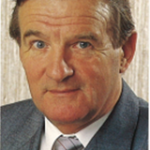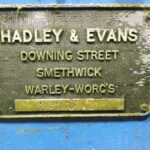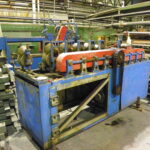“Don’t Tell Me it Can’t Be Done!”

Philip Hadley Snr
It was met with great sadness when we heard the news that Philip had passed away on 15th October 2022. After looking through our archives we came across an article that Philip wrote in 1989, when the company celebrated it’s 25th Anniversary. We hope that you enjoy reading how he started the company in 1964.
“Don’t Tell Me it Can’t Be Done!”
My business career started when I was ten years old. My father made me a marble stall which was very successful, so I requested three more for my friends, taking 50 per cent of the profit as my commission. Unfortunately, the success story only lasted a few weeks because other children’s mothers were complaining to the headmaster that they had lost their milk and dinner money on my marble stores.
After failing my 11-plus exam – I was never any good at exams, but keen to learn – I started work at the age of 14. My employers, George Whitehouse & Co Ltd in Birmingham, were manufacturers of rolled sections, and being the youngest in the tool room, I landed the job of making the tea.
This budding career was interrupted by a spell of 2½ years of National Service. In the army I reached the dizzy rank of corporal, but upon my return to civvy street I found myself back in the same company.
Some years later I upset the manager by suggesting improvements in the company’s methods of tool design and manufacture. One particular set of tools had been troublesome for a number of years. I had been told not to touch them, but I risked my job by making a few modifications. The alterations were completely successful, and the reward was the opportunity of having my ideas considered from then on.

At the age of 33, I decided to start a business in company with two colleagues. We each invested £50 in the grand scheme, which was to build a rolling mill in the front room of one partner’s house. The £150 available for investment did not go far, even in 1961, so we each put £2 per week in the kitty until the machine was completed some two years later. The very first length of section was rolled by lifting the sash cord window and rolling into the back yard.
Our first proper manufacturing premises were 900 square feet near the Boar’s Head in Perry Barr. As we had no lifting equipment, the steel coils were slid down a pair of steel channel ramps, straight off the side of the lorry. It was a pretty risky operation. We had many problems with the original machine’s clutch design, which we had no previous experience of, but eventually we overcame these difficulties, and the machine rolled many millions of feet of section before being scrapped.
The company’s biggest break came with the requirement from the motor industry for curved section which we supplied and maintained with very accurate dimension control. The ability to supply these sections gave us a substantial edge over established manufacturers, although in hindsight the advantage was not capitalised on a much as it could have been.
Being a very small company without a sales force, we acquired a reputation for succeeding with difficult projects where others failed. Subsequently, I coined the phrase, “There’s no such thing as it cor be done.” A memo went out to this effect: with so many Black Country employees, no other spelling seemed appropriate.
Our move into Downing Steet came about 24 years ago. I remember one day our bank manager came to visit. He was almost in tears and stated that he wants to retire before we went bust. He retired contentedly and we immediately changed bankers, going from strength to strength.
 The ground floor manufacturing area was 4,500sq ft with a ramp for vehicles, as it was below street level. Into that area we squeezed 5 rolling machines plus stocks of coil and finished section, producing over 1 million feet of section per month. After about 3 years with demand increasing, we were running out of space. The result was our first expansion into extra premises and the birth of the group of companies originally known as Hadley & Evans.
The ground floor manufacturing area was 4,500sq ft with a ramp for vehicles, as it was below street level. Into that area we squeezed 5 rolling machines plus stocks of coil and finished section, producing over 1 million feet of section per month. After about 3 years with demand increasing, we were running out of space. The result was our first expansion into extra premises and the birth of the group of companies originally known as Hadley & Evans.
 Whilst the partnership remained legally until 1984, Mr. Evans pursued his interest in rolling machine manufacturer from about 1966, leaving the running of the section manufacturing company and its subsequent evolution into the current group under my supervision. The first partner’s interests were acquired during our part-time working and the Evans family interests were purchased in 1984.
Whilst the partnership remained legally until 1984, Mr. Evans pursued his interest in rolling machine manufacturer from about 1966, leaving the running of the section manufacturing company and its subsequent evolution into the current group under my supervision. The first partner’s interests were acquired during our part-time working and the Evans family interests were purchased in 1984.
Times were very often precarious during the recession which started in 1979/1980. Many of our customers were forced into liquidation, with the result that we were obliged to fight many battles with official receivers. Despite these uncertain times, the Group doubled in size during the period, whereas many of our competitors went to the wall.
A major factor in keeping the company at the forefront of cold rolled sections has been our policy of building our own machines and tooling. This has given us continual improvements in efficiency and capability. Another important factor is the philosophy that small is beautiful. Small company teams within the Group are able to identify with their own successes and grow in stature.
Having worked on the shop floor and being aware of how easy it is for even minor problems to grow into discontent, I decided that the company should have a profit-sharing scheme in order to make it in every employee’s interest that the company should not be harmed. 15 per cent of our profits are allocated for bonus payments to employees.
What pleases me most about the company is that it continues to give employees the opportunity to grow as the company expands. I believe strongly in internal promotion, and we should always ensure that exciting new opportunities are first offered to the people who have helped create these opportunities.
 I have often been asked what my ambition was when I was in my twenties. It was to be made foreman by the time I was 40 years old. Some of our employees are now able to set their sights rather higher than mine in those early years. Many aim to achieve great things at comparatively early ages, but that ambition is something I encourage, for no matter what a company’s past achievements are, it relies on its present and future calibre of personnel to succeed.
I have often been asked what my ambition was when I was in my twenties. It was to be made foreman by the time I was 40 years old. Some of our employees are now able to set their sights rather higher than mine in those early years. Many aim to achieve great things at comparatively early ages, but that ambition is something I encourage, for no matter what a company’s past achievements are, it relies on its present and future calibre of personnel to succeed.
Philip Hadley Jnr
We contacted Phil Hadley Jnr about publishing the article again, in response Philip said:
“I really enjoyed reading this again, I started with the company in 1978, following my return to the UK from working in Germany, so had been involved for about 11 years when this 25 year document was produced.
As a schoolboy teenager I witnessed the first length of section being rolled out of a window when the machine was tested and I used to earn extra pocket money, working Saturday mornings and school holidays, in the first ‘proper’ premises at Perry Barr. I did about every job at that time (not making the tea) related to toolmaking, roll turning, and operating the rolling mill/line producing section. That would probably be illegal under today’s state rules (maybe it was then?).
My father made many important points relating to his business philosophy, in his history ‘piece’, two of them, ‘small is beautiful’ and promoting from within, growing our own talent, supporting our people to realise their full potential stand out for me, something I tried to build upon with the continuous improvement initiative.
Our very strong employee culture and corporate success came from these ‘philosophy’ cornerstones.
The wonderful comments I have received from all those current and former people who worked in the company have reminded me of something I had forgotten. The company, in its various forms/names over the years from establishment to beyond my father’s retirement was a family, the family of Hadley (the company).
A great experience for us all and something which few businesses can claim to have achieved.
We often talked about the Hadley Way which was likely to be the complete opposite way to everyone else’s ‘way’.
Regards Phil”